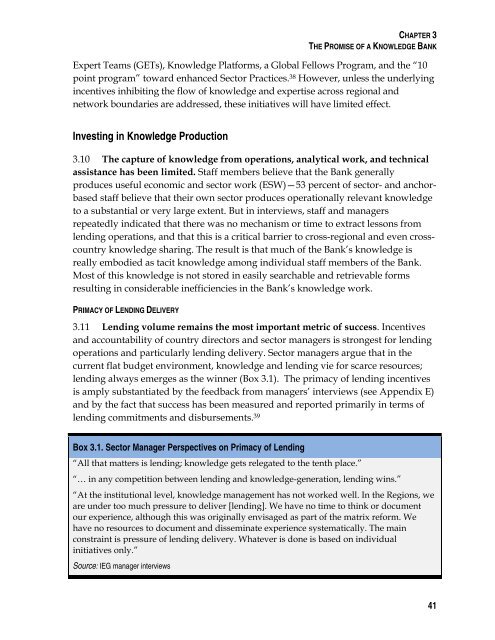The Matrix System at Work - Independent Evaluation Group - World ...
The Matrix System at Work - Independent Evaluation Group - World ...
The Matrix System at Work - Independent Evaluation Group - World ...
You also want an ePaper? Increase the reach of your titles
YUMPU automatically turns print PDFs into web optimized ePapers that Google loves.
CHAPTER 3<br />
THE PROMISE OF A KNOWLEDGE BANK<br />
Expert Teams (GETs), Knowledge Pl<strong>at</strong>forms, a Global Fellows Program, and the “10<br />
point program” toward enhanced Sector Practices. 38 However, unless the underlying<br />
incentives inhibiting the flow of knowledge and expertise across regional and<br />
network boundaries are addressed, these initi<strong>at</strong>ives will have limited effect.<br />
Investing in Knowledge Production<br />
3.10 <strong>The</strong> capture of knowledge from oper<strong>at</strong>ions, analytical work, and technical<br />
assistance has been limited. Staff members believe th<strong>at</strong> the Bank generally<br />
produces useful economic and sector work (ESW)—53 percent of sector- and anchorbased<br />
staff believe th<strong>at</strong> their own sector produces oper<strong>at</strong>ionally relevant knowledge<br />
to a substantial or very large extent. But in interviews, staff and managers<br />
repe<strong>at</strong>edly indic<strong>at</strong>ed th<strong>at</strong> there was no mechanism or time to extract lessons from<br />
lending oper<strong>at</strong>ions, and th<strong>at</strong> this is a critical barrier to cross-regional and even crosscountry<br />
knowledge sharing. <strong>The</strong> result is th<strong>at</strong> much of the Bank’s knowledge is<br />
really embodied as tacit knowledge among individual staff members of the Bank.<br />
Most of this knowledge is not stored in easily searchable and retrievable forms<br />
resulting in considerable inefficiencies in the Bank’s knowledge work.<br />
PRIMACY OF LENDING DELIVERY<br />
3.11 Lending volume remains the most important metric of success. Incentives<br />
and accountability of country directors and sector managers is strongest for lending<br />
oper<strong>at</strong>ions and particularly lending delivery. Sector managers argue th<strong>at</strong> in the<br />
current fl<strong>at</strong> budget environment, knowledge and lending vie for scarce resources;<br />
lending always emerges as the winner (Box 3.1). <strong>The</strong> primacy of lending incentives<br />
is amply substanti<strong>at</strong>ed by the feedback from managers’ interviews (see Appendix E)<br />
and by the fact th<strong>at</strong> success has been measured and reported primarily in terms of<br />
lending commitments and disbursements. 39<br />
Box 3.1. Sector Manager Perspectives on Primacy of Lending<br />
“All th<strong>at</strong> m<strong>at</strong>ters is lending; knowledge gets releg<strong>at</strong>ed to the tenth place.”<br />
“… in any competition between lending and knowledge-gener<strong>at</strong>ion, lending wins.”<br />
“At the institutional level, knowledge management has not worked well. In the Regions, we<br />
are under too much pressure to deliver [lending]. We have no time to think or document<br />
our experience, although this was originally envisaged as part of the m<strong>at</strong>rix reform. We<br />
have no resources to document and dissemin<strong>at</strong>e experience system<strong>at</strong>ically. <strong>The</strong> main<br />
constraint is pressure of lending delivery. Wh<strong>at</strong>ever is done is based on individual<br />
initi<strong>at</strong>ives only.”<br />
Source: IEG manager interviews<br />
41

















